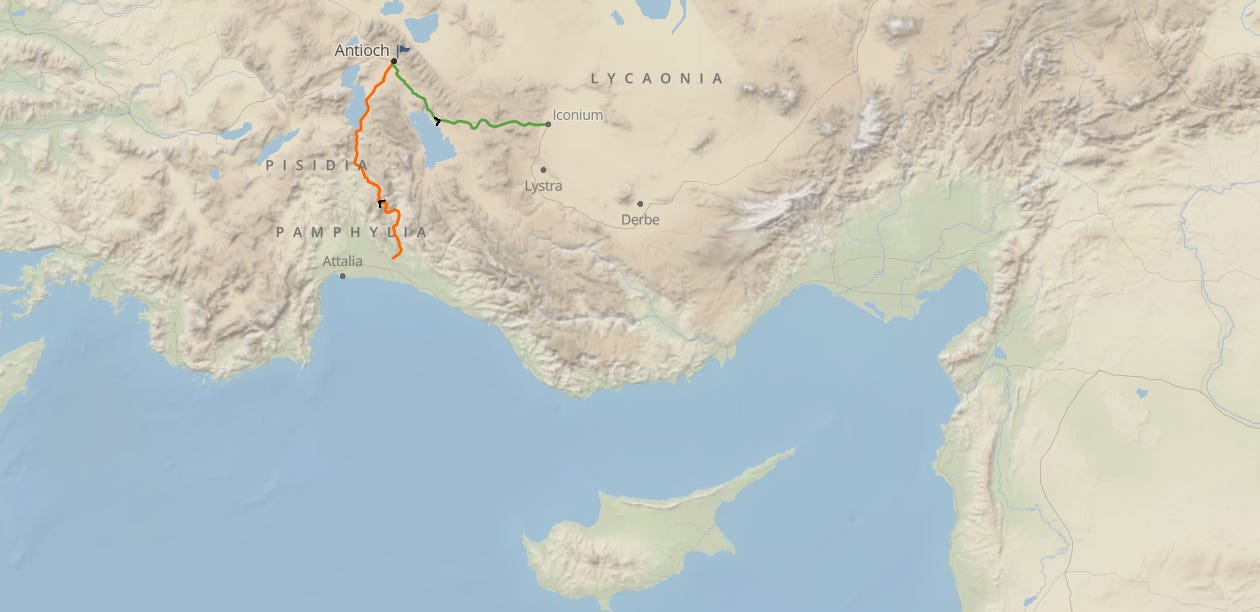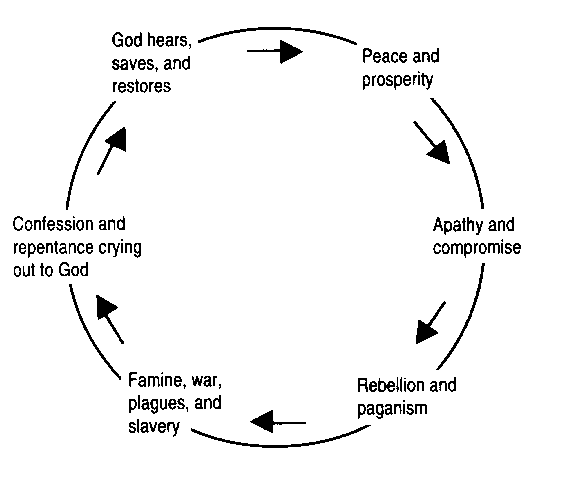A Study of Acts: The Missionaries Travel to Pisidian Antioch
Acts 13:13-25 - The mission moves to Galatia and the people hear Paul begin a sermon.
“Now Paul and his companions put out to sea from Paphos and came to Perga in Pamphylia; but John left them and returned to Jerusalem. But going on from Perga, they arrived at Pisidian Antioch, and on the Sabbath day they went into the synagogue and sat down. After the reading of the Law and the Prophets the synagogue officials sent to them, saying, “Brethren, if you have any word of exhortation for the people, say it.”
Paul stood up, and motioning with his hand said, “Men of Israel, and you who fear God, listen: The God of this people Israel chose our fathers and made the people great during their stay in the land of Egypt, and with an uplifted arm He led them out from it. For a period of about forty years He put up with them in the wilderness. When He had destroyed seven nations in the land of Canaan, He distributed their land as an inheritance—all of which took about four hundred and fifty years. After these things He gave them judges until Samuel the prophet. Then they asked for a king, and God gave them Saul the son of Kish, a man of the tribe of Benjamin, for forty years. After He had removed him, He raised up David to be their king, concerning whom He also testified and said, ‘I have found David the son of Jesse, a man after My heart, who will do all My will.’ From the descendants of this man, according to promise, God has brought to Israel a Savior, Jesus, after John had proclaimed before His coming a baptism of repentance to all the people of Israel. And while John was completing his course, he kept saying, ‘What do you suppose that I am? I am not He. But behold, one is coming after me the sandals of whose feet I am not worthy to untie.’”
Acts 13:13-25 NASB1995
Paul and his companions travel again, this time from Paphos, Crete to Perga, in Pamphylia. Perga is not on the coast, so the group likely docked in a coastal town near Perga (not shown on the map). Here’s a map of this journey, from Precept Austin:
At Perga, John Mark leaves the group and returns to Jerusalem. The reasons why he returned are not known, but the area the missionaries have arrived in was notorious for difficult terrain and hostile criminals and perhaps the younger Mark was intimidated by the locale. The green line on the map shows the journey for Mark (not all the way to Jerusalem). Paul is not happy with John Mark, as we will see when the second missionary journey begins, but he is eventually forgiven and brought back into Paul’s trust later in Acts. Here is a good commentary about Mark from Precept Austin:
Although we can never undo a failure, we can learn from the experience and profit by it. A baseball pitcher who loses a game because he throws a fastball right where the batter wants it may come back four days later and hurl a shutout. He'll never erase the lost game from his record, but his failure can teach him valuable lessons that will help him to chalk up more wins than losses.
In Acts we read that John Mark accompanied Paul and Barnabas when they started their first missionary journey (Acts 13:5), but he soon departed from them (Acts 13:13). While he was at home, he apparently regretted what he had done, so he asked to be included the next time his older friends set out. Barnabas wanted to give him another chance, but Paul didn't, so they parted company and formed two teams—Barnabas taking Mark, and Paul taking Silas. Young Mark couldn't erase his first failure, but he must have learned from it because he became a respected Christian leader of his clay. Further-more, God used him to write one of the four gospels; and Paul, in his second prison epistle to Timothy, asked for Mark, saying, "He is useful to me for ministry."
It doesn't do any good to brood about what went wrong. Wishing we could do something over is an exercise in futility. Each day is new. With God's help we can succeed, if we learn from yesterday's failure.
Often I wish that we had made a decision to have children. But we can’t change the past but can only repent about sins and failures in our lives, accept God’s grace and move on to a new day. Mark succeeds in the long run. We have until that last breath to get it right with Him.
Here’s another map from Precept Austin showing the location of Pisidian Antioch (not to be confused with the original Antioch located in present-day Syria discussed earlier in Acts). Pisidian Antioch (literally meaning Antioch towards Pisidia) was a Roman colony in the ethnic region of Phrygia in the Roman province of Galatia. It was located about 160 miles from Perga in a rugged, mountainous region. Some commentary I read ties in this journey to Pisidian Antioch with the fact that Paul was likely suffering some malady (perhaps malaria?) when he first preached to the “Galatians” and he might have felt better at the cooler, higher altitude.
On the Sabbath the group goes into the synagogue in Pisidian Antioch and sits down. After the reading of the law and the prophets, the synagogue officials ask their visitors if they have anything to say. Oooh, boy - I’m not sure they realized what they asked for: This is the golden opportunity for Paul to hit them with the Gospel message! He gestures at the gathering to quiet them and tells them that those who fear God must listen!
Paul begins his message in a similar way to the sermons of Peter and Stephen, with an historical overview back to the Exodus and the Israelites wandering in the wilderness for 40 years where God put up with them, the awarding of the lands in Canaan, the judges, and then the kings they wanted. God is especially pleased with David and promises that from his descendants He would bring forth a savior, named Jesus. Jesus is proclaimed by John the Baptist, who calls the people to repentance and says he was not worthy to untie the sandals of Him who has come.
This history is a litany of the cycle that the people of Israel found themselves in, over and over, especially during the time of Judges and again in the years leading up to the exiles with the divided kingdoms. I like this chart from Precept Austin that summarizes events pretty well:
Israel was never satisfied with God’s gifts. Paul emphasizes that in his introduction to his sermon (and I’m sure the sermon was much longer than the condensed version that Luke records). Also from Precept Austin, Chuck Swindoll points out three interesting aspects of this introduction:
Paul’s short history of Israel highlighted three facts, each with an important implication:
Fact 1: The Lord had been faithful to Israel despite the disobedience of the people.
Implication: He would continue to be faithful to disobedient Jews.Fact 2: God’s form of government over Israel had evolved over time, usually in response to Israel’s disobedience.
Implication: His administration of the nation would continue to evolve, and it was about to change again.Fact 3: The Lord had replaced a bad king, Saul, with a good king, David.
Implication: The Lord was again about to present a new leader. (Swindoll's Living Insights New Testament Commentary – Acts)
Paul is warming up his audience to know that things have changed dramatically! God is faithful but a new leader is now the King.
My next devotional examines Acts 13:26-43 - Paul preaches salvation.
Heaven on Wheels Daily Prayer:
Dear Lord - I ask for insight and guidance as I continue to study this sermon by Paul and its implications for the early church. I thank you for your forgiveness and grace and look forward rather than wallow in regret. Amen.
Scripture quotations taken from the (NASB®) New American Standard Bible®, Copyright © 1960, 1971, 1977, 1995 by The Lockman Foundation. Used by permission. All rights reserved. lockman.org
Precept Austin was accessed on 10/30/2024 to review commentary and maps for Acts 13:13-25.






